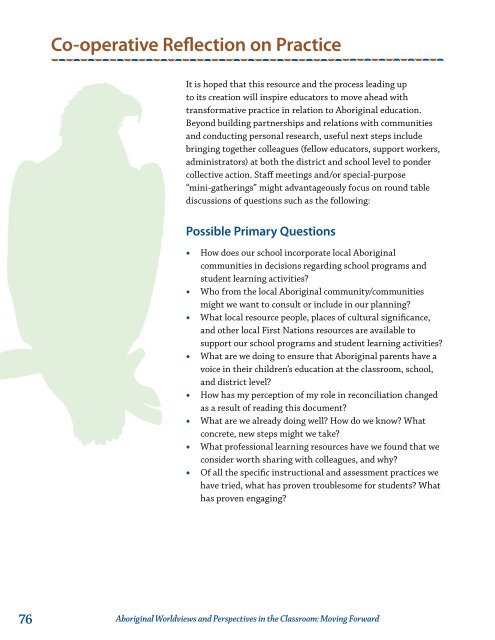Aboriginal Worldviews and Perspectives in the Classroom
Ab-Worldviews-and-the-Classroom-220mzng
Ab-Worldviews-and-the-Classroom-220mzng
Create successful ePaper yourself
Turn your PDF publications into a flip-book with our unique Google optimized e-Paper software.
Co-operative Reflection on Practice<br />
It is hoped that this resource <strong>and</strong> <strong>the</strong> process lead<strong>in</strong>g up<br />
to its creation will <strong>in</strong>spire educators to move ahead with<br />
transformative practice <strong>in</strong> relation to <strong>Aborig<strong>in</strong>al</strong> education.<br />
Beyond build<strong>in</strong>g partnerships <strong>and</strong> relations with communities<br />
<strong>and</strong> conduct<strong>in</strong>g personal research, useful next steps <strong>in</strong>clude<br />
br<strong>in</strong>g<strong>in</strong>g toge<strong>the</strong>r colleagues (fellow educators, support workers,<br />
adm<strong>in</strong>istrators) at both <strong>the</strong> district <strong>and</strong> school level to ponder<br />
collective action. Staff meet<strong>in</strong>gs <strong>and</strong>/or special-purpose<br />
“m<strong>in</strong>i-ga<strong>the</strong>r<strong>in</strong>gs” might advantageously focus on round table<br />
discussions of questions such as <strong>the</strong> follow<strong>in</strong>g:<br />
Possible Primary Questions<br />
••<br />
How does our school <strong>in</strong>corporate local <strong>Aborig<strong>in</strong>al</strong><br />
communities <strong>in</strong> decisions regard<strong>in</strong>g school programs <strong>and</strong><br />
student learn<strong>in</strong>g activities?<br />
••<br />
Who from <strong>the</strong> local <strong>Aborig<strong>in</strong>al</strong> community/communities<br />
might we want to consult or <strong>in</strong>clude <strong>in</strong> our plann<strong>in</strong>g?<br />
••<br />
What local resource people, places of cultural significance,<br />
<strong>and</strong> o<strong>the</strong>r local First Nations resources are available to<br />
support our school programs <strong>and</strong> student learn<strong>in</strong>g activities?<br />
••<br />
What are we do<strong>in</strong>g to ensure that <strong>Aborig<strong>in</strong>al</strong> parents have a<br />
voice <strong>in</strong> <strong>the</strong>ir children’s education at <strong>the</strong> classroom, school,<br />
<strong>and</strong> district level?<br />
••<br />
How has my perception of my role <strong>in</strong> reconciliation changed<br />
as a result of read<strong>in</strong>g this document?<br />
••<br />
What are we already do<strong>in</strong>g well? How do we know? What<br />
concrete, new steps might we take?<br />
••<br />
What professional learn<strong>in</strong>g resources have we found that we<br />
consider worth shar<strong>in</strong>g with colleagues, <strong>and</strong> why?<br />
••<br />
Of all <strong>the</strong> specific <strong>in</strong>structional <strong>and</strong> assessment practices we<br />
have tried, what has proven troublesome for students? What<br />
has proven engag<strong>in</strong>g?<br />
76 <strong>Aborig<strong>in</strong>al</strong> <strong>Worldviews</strong> <strong>and</strong> <strong>Perspectives</strong> <strong>in</strong> <strong>the</strong> <strong>Classroom</strong>: Mov<strong>in</strong>g Forward


